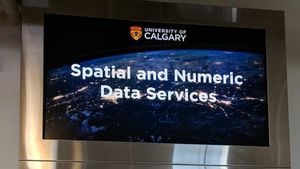We have been having some internal discussion about the usefulness of the ‘generational turn’ in much recent exploration of reading, media consumption, and learning and research behaviors. It is impossible to move without bumping into a discussion of netgen, natives and immigrants, Y or X, screenagers, the Google generation, and so on.
I incline to Andy Powell’s scepticism, and not just because because I have a significant birthday coming up 😉 He suggests that attitude is more important than age, although in response one might wonder about the influence of age on attitude.
Anyway, I also liked Dave White’s presentation of the terms ‘resident’ and ‘visitor’ (as alternatives to ‘native’ and ‘immigrant’) that was the occasion of Andy’s post.
Anyway, our students appropriation of online services did not seem to follow a simple pattern based on skill level. It seemed to depend on if they saw the web as a ‘place to live’ or as a collection of useful tools. This underlying motivation lead us to outline two main categories of distance learning student. [TALL blog » Blog Archive » Not ‘Natives’ & ‘Immigrants’ but ‘Visitors’ & ‘Residents’]
These two categories are ‘resident’ and ‘visitor’.
The resident is an individual who lives a percentage of their life online. The web supports the projection of their identity and facilitates relationships. These are people who have an persona online which they regularly maintain. This persona is normally primarily in a social networking sites but it is also likely to be in evidence in blogs or comments, via image sharing services etc The Resident will of course interact with all the practical services such as banking, information retrieval and shopping etc but they will also use the web to socialise and to express themselves. They are likely to see the web as a worthwhile place to put forward an opinion. They often use the web in all aspects of the of their lives; professionally, for study and for recreation. In fact the resident considers that a certain portion of their social life is lived out online. The web has become a crucial aspect of how they present themselves and how they remain part of networks of friends or colleagues. [TALL blog » Blog Archive » Not ‘Natives’ & ‘Immigrants’ but ‘Visitors’ & ‘Residents’]
The Visitor is an individual who uses the web as a tool in an organised manner whenever the need arises. They may book a holiday or research a specific subject. They may choose to use a voice chat tool if they have friends or family abroad. Often the Visitor puts aside a specific time to go online rather than sitting down at a screen to maintain their presence at any point during the day. They always have an appropriate and focused need to use the web but don’t ‘reside’ there. They are sceptical of services that offer them the ability to put their identity online as don’t feel the need to express themselves by participating in online culture in the same manner as a Resident. [TALL blog » Blog Archive » Not ‘Natives’ & ‘Immigrants’ but ‘Visitors’ & ‘Residents’]
He makes the interesting point that although a resident may have set up various tools to manage their online information flow they are not necessarily more effective at researching any particular topic than a visitor. And here is the pragmatic concluding paragraph …
This Visitor, Resident distinction is useful when considering which technologies to provide for online learners. For example if your learners are mainly Visitors they are unlikely to take advantage of any feed based system for aggregated information you may put in place. They are also unlikely to blog or comment as part of a course. The Resident will expect to have the opportunity to offer opinions on topics and to socialise around a programme of study. In fact they are likely to find ways of doing this even if they are not ‘officially’ provided. We offered membership of a facebook group to our students as they left their online courses. The majority signed-up without question as they wanted to stay in touch with fellow students and continue discussions. The remainder saw the group as pointless and a possible invasion of privacy. Both sides of this argument are correct… It’s a question of approach and motivation, hence Visitors and Residents. [TALL blog » Blog Archive » Not ‘Natives’ & ‘Immigrants’ but ‘Visitors’ & ‘Residents’]
I find this distinction quite helpful and it maps well to experiences. Think of something as simple as RSS for example. Some people – residents – expect anything that moves to have an RSS feed, and their aggregator is a primary channel of information about the world. Others happily live without it. Or think about the ‘amplified conference‘, the set of social networking, communication and annotation tools that accompany some conference events. For residents, having a ‘tag’ for a conference that unifies its online amplification (blog entries, photos on flickr, etc) is obvious and natural; visitors may not see the point.
Of course, it is often residents who talk about the importance of the residential behaviors. It would be interesting to have a sense of proportion: how do they reckon the students on their online courses break down across the two categories?


